What if a game took heavy inspiration from the works of H. R. Giger and Zdzisław Beksiński, and then offered very little gameplay to match? Because that’s what’s powering my scorn for Scorn, a first-person puzzle game featuring cool visuals, terrible combat, and not much satisfaction.
There is even less plot than you think. You are a humanoid that was crawling through a purple desert towards a phallic structure slowly wasting away in the winds. The ground collapses under your feet, and you get knocked unconscious before later waking up in front of a door. Go get ’em, tiger.
In Scorn, there’s nothing motivating the player character — you push forward because that’s what you do as a player. You don’t know why the protagonist does it. You don’t even know how the protagonist does it. How do they know to operate the machinery and what it will do? The player, ultimately, wishes to beat the game. The protagonist? Who can say?
Wandering while wondering
Thus we set the stage for catfighting about an alien world with ineffable goals. It is really hard to create something truly alien when you’re operating a human mind. So you can’t really condemn Scorn for offering a world without bothering to set up some sort of narration and plot structure that would attempt to be alien while still remaining satisfyingly understandable.
Yet that would have been nicer than — checks notes — nothing. It’s not like we don’t have games that feature bizarre cultures and civilizations. Zeno Clash was weird, Perimeter was weird, and Vangers was very weird. But they were satisfyingly alien while still being parsable.
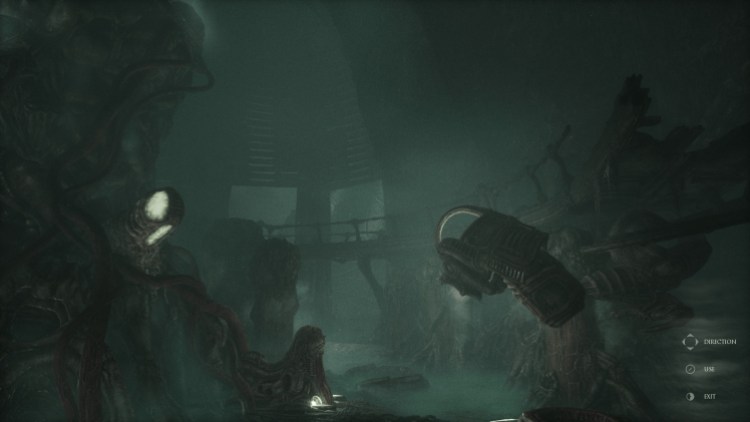
As you explore the game world, you’ll be constantly struck by the feeling “that certainly is a thing.”
During the most recent Steam Next Fest, I played The Eternal Cylinder, a game about controlling a pack of two-legged sacks that have the Kirby-esque power of gaining abilities based on the things they eat. They’re running away from the Endless Cylinder that’s crushing the countryside. It’s very easy to understand for all its oddities.
The Eternal Cylinder found more success in the task of tying its weird world into the gameplay than Scorn. For all the biomechanical trappings in the latter game, the puzzles feel very much mundane. A lot of it is flipping switches and seeing cranes lift things, but the switch is slimy and the crane has rounded edges.
That’s the other crime of Scorn: it’s populated by puzzle pieces from an early 2000s first-person shooter, but gross. Reskin all the platform raising in, say, Half-Life, to have boney textures and you’re mostly there. For crying out loud, I had to stop an industrial fan at one point, which is the most mundane thing you can do in an FPS. I had to fist a console to do it, but that’s it.
I’ll give the puzzle design one thing, though: even though they run on what a friend described as Myst-like “moon logic,” I never really felt lost. And outside of one incident where I just bungled past an elevator early on, I was proceeding through them at a breezy pace.
The incomprehensible dullness of a mind alien
Outside of, like, foreskin bridges, very few environmental designs are using biotech in an interesting way. Trams run on tracks, and gondolas are carried by cranes. You’re not going down tracheas or being absorbed via a semi-permeable membrane at any point. You’re even collecting keycards to open doors, except that they are a fleshy RC car remote you’re carrying around.
The closest thing to ‘really weird design’ stuff is the infection that’s spreading in the alien buildings. A of lot of the growths blocking passages and such are not just writing meat; they’re a collection of melting enemy creatures, forming a sort of fleshy coral. Too bad the only way you interact with them is having a fan or a gondola rip through the blocking growths, splattering blood.
There’s one thing that’s potentially good about Scorn’s puzzle designs. It’s violence. When we imagine biotech and biopunk worlds, they’re all based on violence: a living gun using bugs it crushes in the ammo chamber to fire. So you could almost sense some theme there — if the game was about something.
But violence that currently is implied in puzzles is not exactly the way the world works. It’s more about the protagonist ripping apart bodies and crushing life to make the stalled machinery work for them.
There’s an early puzzle that needs a second operator to keep a door open. But it actually has two solutions, one of them a lot more violent and callous than the other — except that it’s not telegraphed in any way. You’ll never know whether what you do next is going to kill a pod person or something. Oops!
Boom, squelch, the sound of door’s heart
At least the guns somewhat in Scorn go a little bit Tyranid about things. You’re always using the same grip, but you change the fleshbone front, and you store your spare ammo in a tick that also acts as your healing repository. To reload, you take the ammo from the tick and set it in the fleshy bits of the gun. That’s it, that’s where creativity ends, because the weapons in the game are a bio-jackhammer, a pistol, a shotgun/big gun, and a grenade launcher.
And even then they’re not good, because the combat is very unsatisfying. Maybe it’s supposed to be survival horror, but it’s not very survival-like when enemies spawn on your path or are placed just around the corner for you to run into. With the scarcity of ammo and healing in the game, it’s actually a good thing to just try and run past. But that’s not always an option, and most enemies have ranged attacks as well.
The bio-jackhammer doesn’t have ammo, using reserves of compressed air that refill themselves,. Trying to hit someone with it, however, is some of the least amount of fun I’ve ever had in melee combat. I haven’t determined whether anything like weak point damage exist in Scorn. The executions that come with melee take too long and repeat too often even for how few of them exist in the game.
They should have sent a poet
Despite the game’s aesthetic not meshing well with gameplay functionality, the environments feel great. When you get glimpses of the outside world, the game scores high for me. Unearthly cyclopean structures jutting out of green mists? Yes, please.
The audio does a passable job in comparison, except for when it comes to impressive music. Sound cues for the decrepit vistas are great and really enhance the atmosphere, which is the one strong parts of the game. Even if the last level of Scorn was designed after taking a look at all the eroticism of H. R. Giger’s works and deciding that Garth Marenghi was right about authors who use subtext.
And that sums up Scorn: adequate puzzles wrapped around in aesthetics (but not mechanical design) true to its inspiration, and with very little explanation. It’s a short game, so it won’t annoy you for too long. But it also ends like half the short sci-fi stories do: with a terrible twist. Oh well.

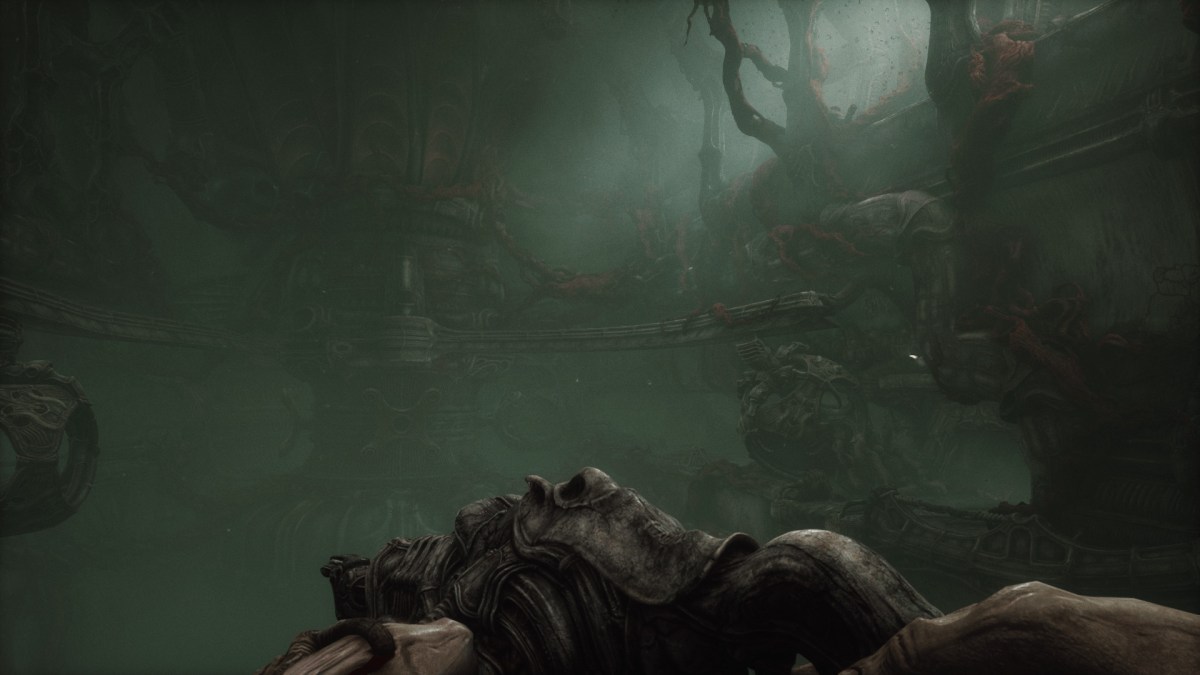

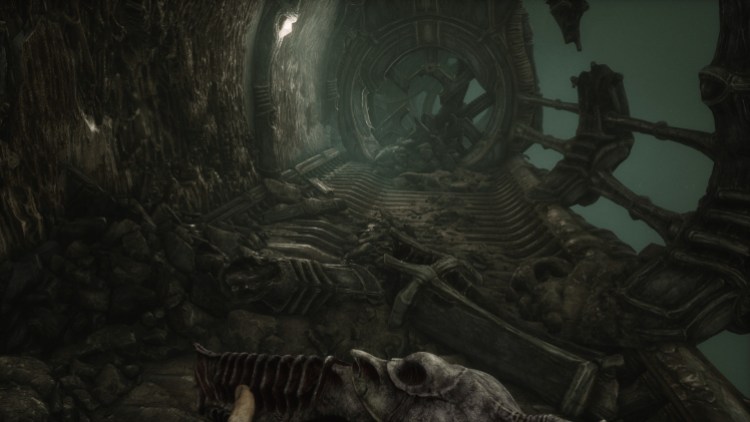
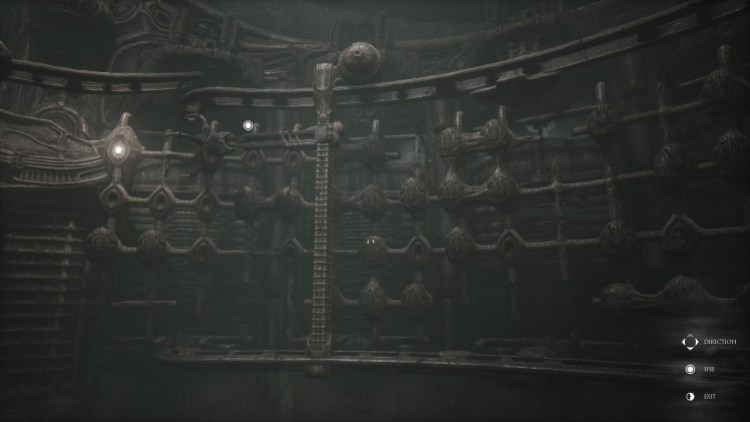
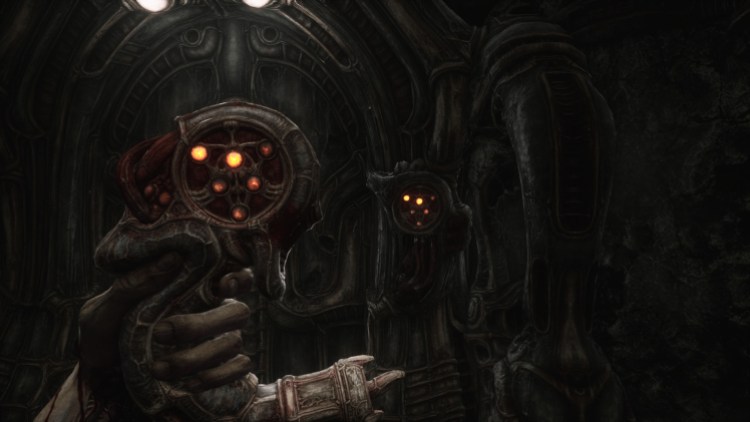
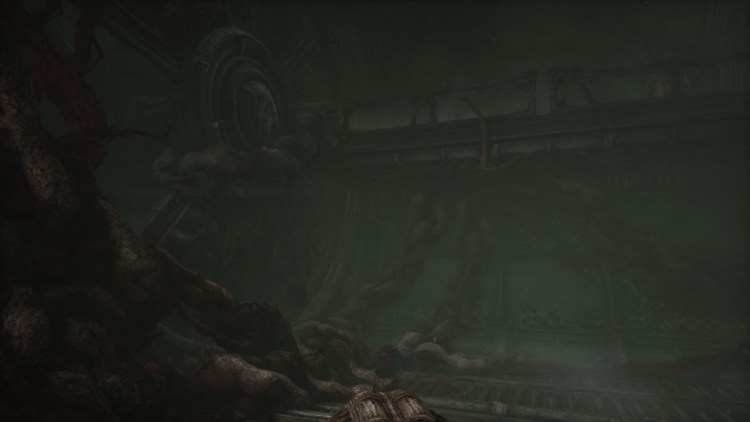
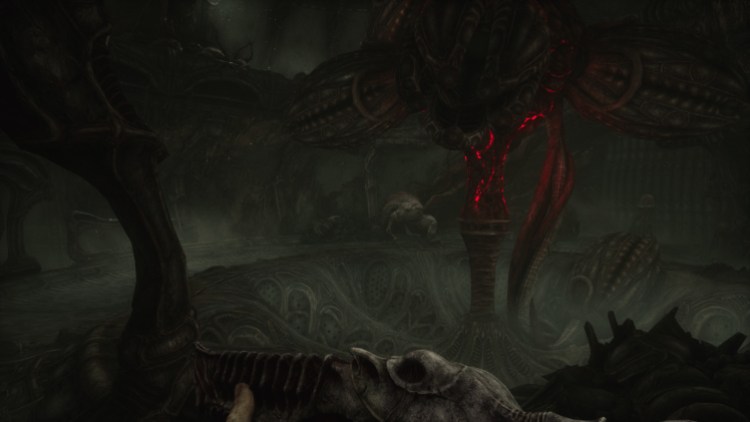
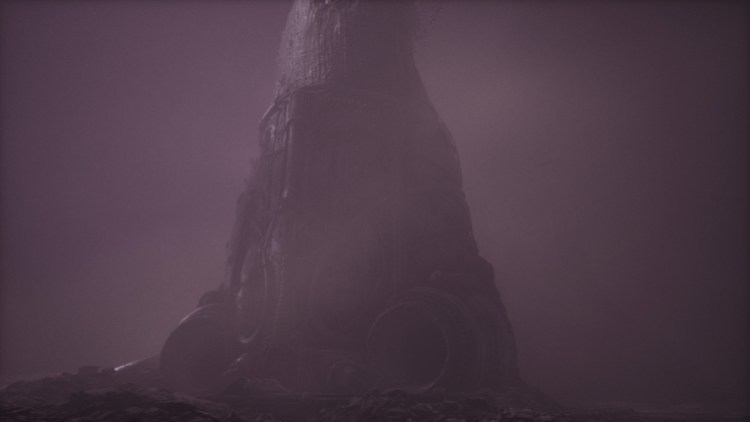





Published: Oct 17, 2022 11:00 am